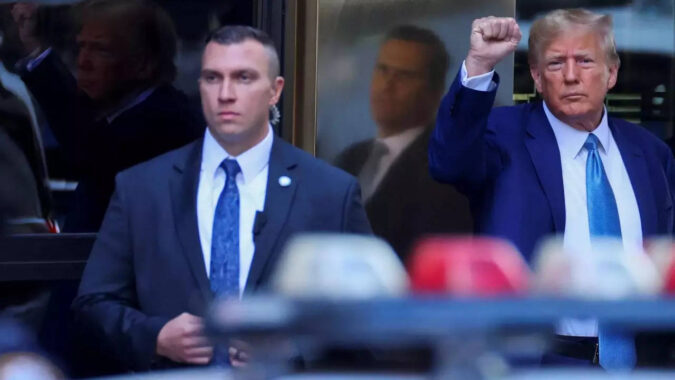NEW YORK: Former President Donald Trump arrived for questioning on Thursday in a $250 million civil fraud lawsuit against him by the New York attorney general.
The deposition will take place behind closed doors and has not generated the kind of attention that his surrender on separate criminal charges did last week.
There was a smattering of protesters outside New York Attorney General Letitia James‘ offices in lower Manhattan when Trump arrived, with one group carrying a banner reading, “No One Is Above the Law.”
Trump, who is seeking the Republican nomination for the 2024 presidential election, will be asked about his business practices during the deposition. The lawsuit accuses him and others of a decade-long scheme to manipulate property values and his net worth in order to obtain favorable loans and tax benefits.
The trial in the case is scheduled to begin Oct. 2. Thursday’s deposition could be used to try to discredit any testimony Trump may give at trial, or be offered as testimony if he is unavailable to appear.
It is not the first time Trump is facing the New York attorney general. Under questioning in August, before the case was filed, Trump invoked his right against self-incrimination under the U.S. Constitution’s Fifth Amendment more than 400 times. Legal experts say the attorney general is also entitled to a deposition after the filing of the lawsuit.
“I will finally be able to show what a great, profitable, and valuable company I built,” Trump said in one post on the Truth Social platform early Thursday, after attacking the attorney general and what he called her “persecution,” as well as the judge in the case and the district attorney who brought the separate criminal charges.
Trump, whose surrender on April 4 drew worldwide media attention and a huge police presence, returned to his home in Florida after pleading not guilty.
Those charges were tied to allegations that he orchestrated a hush-money payment to a porn star before the 2016 election in exchange for her silence over an alleged sexual encounter.
Trump has said the sexual encounter did not take place. It marked the first time a U.S. president has been criminally charged while in office or after.
Trump also faces federal investigations stemming from his handling of government documents after leaving the White House and alleged attempts to overturn his 2020 election defeat as well as a state-level probe in Georgia into whether he unlawfully sought to reverse the 2020 election results there.
In addition, a trial is set for April 25 in federal court in New York over whether Trump defamed former Elle magazine columnist E. Jean Carroll by denying he raped her. Trump is seeking to delay that trial.
The deposition will take place behind closed doors and has not generated the kind of attention that his surrender on separate criminal charges did last week.
There was a smattering of protesters outside New York Attorney General Letitia James‘ offices in lower Manhattan when Trump arrived, with one group carrying a banner reading, “No One Is Above the Law.”
Trump, who is seeking the Republican nomination for the 2024 presidential election, will be asked about his business practices during the deposition. The lawsuit accuses him and others of a decade-long scheme to manipulate property values and his net worth in order to obtain favorable loans and tax benefits.
The trial in the case is scheduled to begin Oct. 2. Thursday’s deposition could be used to try to discredit any testimony Trump may give at trial, or be offered as testimony if he is unavailable to appear.
It is not the first time Trump is facing the New York attorney general. Under questioning in August, before the case was filed, Trump invoked his right against self-incrimination under the U.S. Constitution’s Fifth Amendment more than 400 times. Legal experts say the attorney general is also entitled to a deposition after the filing of the lawsuit.
“I will finally be able to show what a great, profitable, and valuable company I built,” Trump said in one post on the Truth Social platform early Thursday, after attacking the attorney general and what he called her “persecution,” as well as the judge in the case and the district attorney who brought the separate criminal charges.
Trump, whose surrender on April 4 drew worldwide media attention and a huge police presence, returned to his home in Florida after pleading not guilty.
Those charges were tied to allegations that he orchestrated a hush-money payment to a porn star before the 2016 election in exchange for her silence over an alleged sexual encounter.
Trump has said the sexual encounter did not take place. It marked the first time a U.S. president has been criminally charged while in office or after.
Trump also faces federal investigations stemming from his handling of government documents after leaving the White House and alleged attempts to overturn his 2020 election defeat as well as a state-level probe in Georgia into whether he unlawfully sought to reverse the 2020 election results there.
In addition, a trial is set for April 25 in federal court in New York over whether Trump defamed former Elle magazine columnist E. Jean Carroll by denying he raped her. Trump is seeking to delay that trial.
